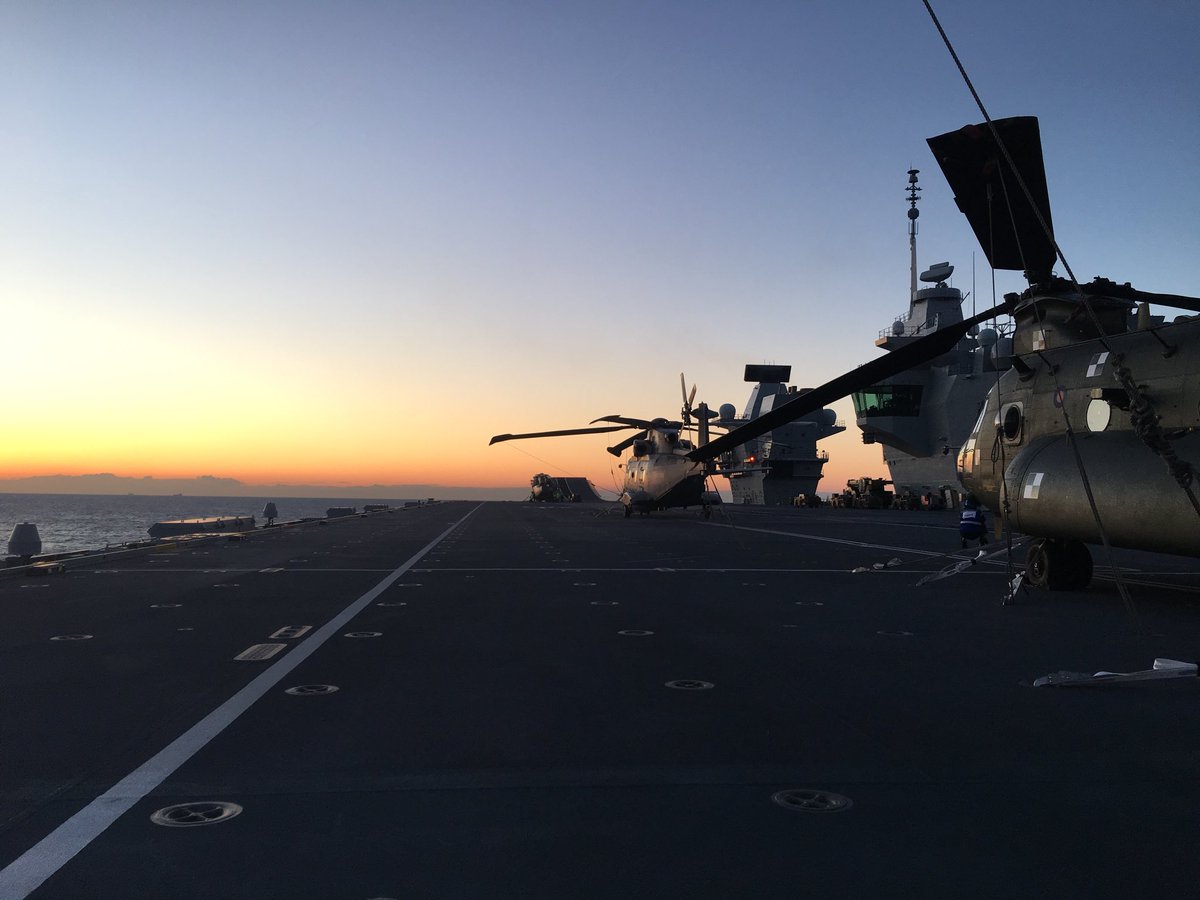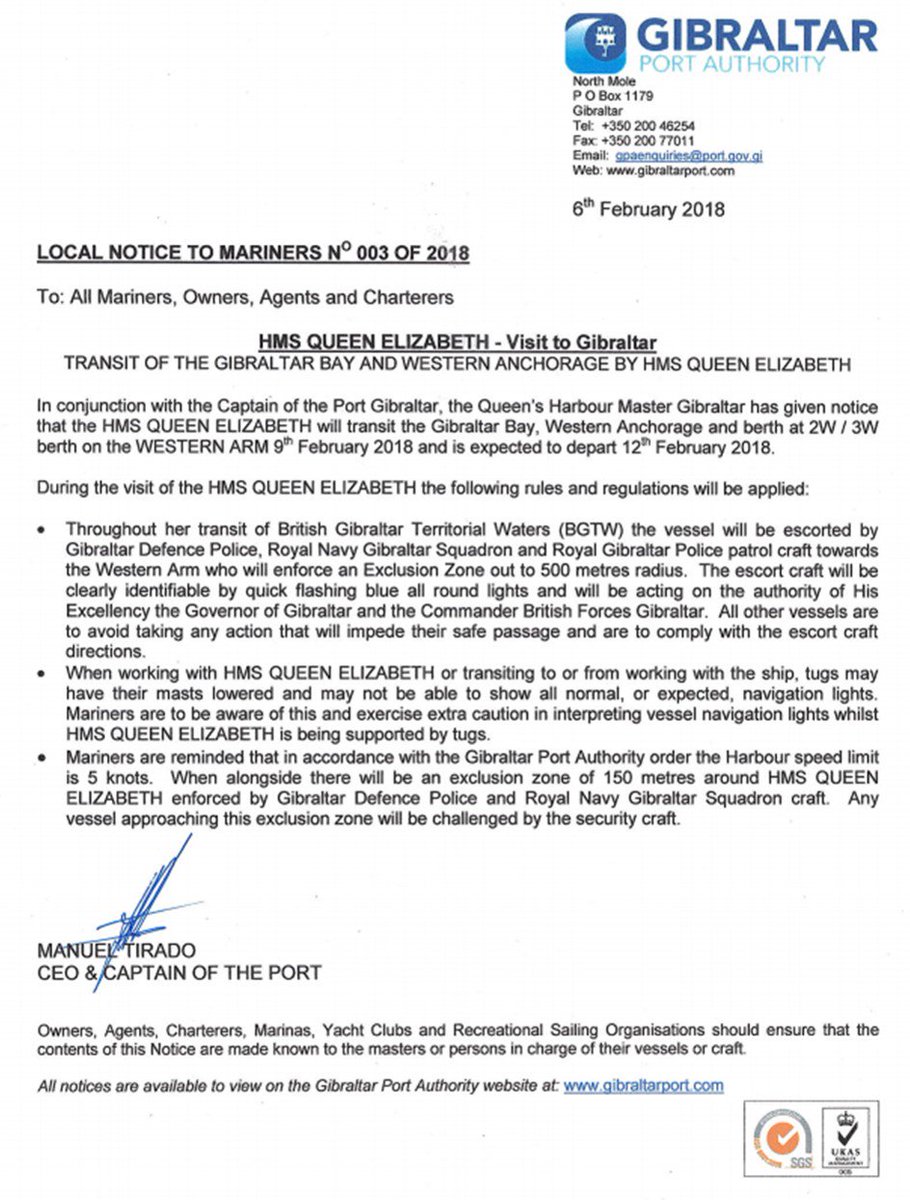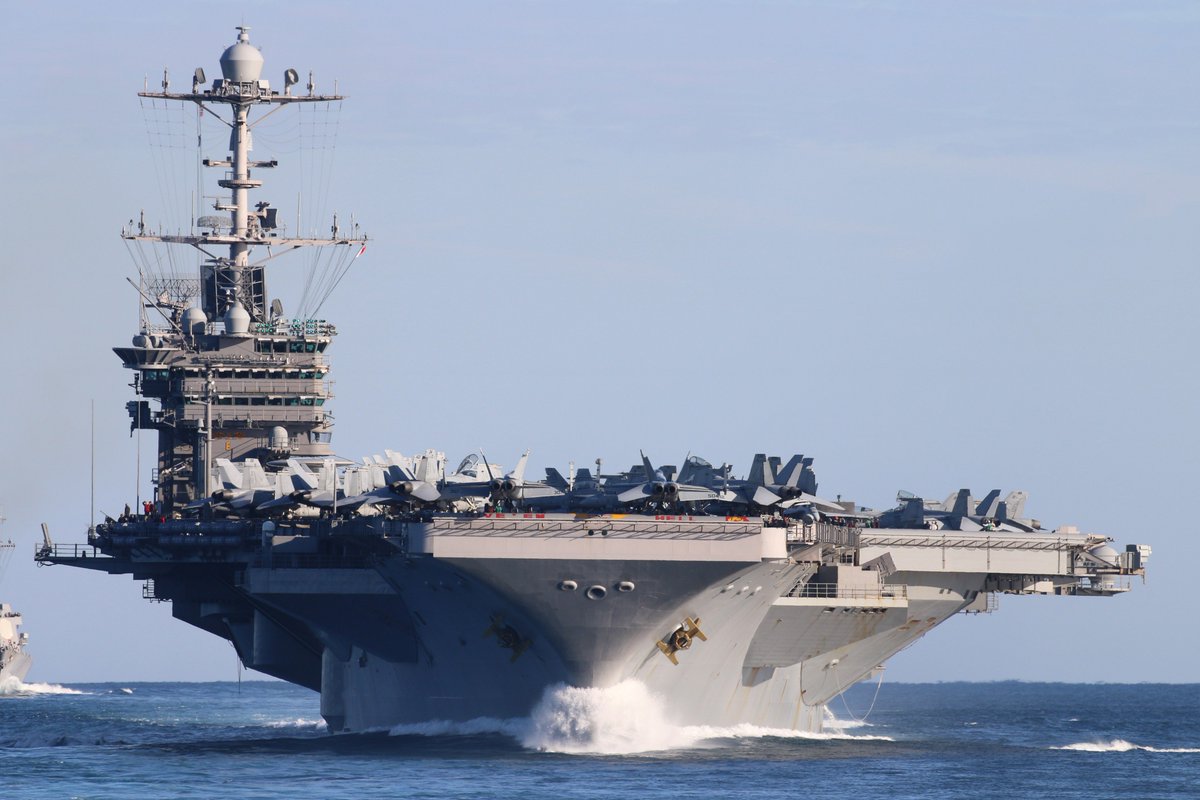You are using an out of date browser. It may not display this or other websites correctly.
You should upgrade or use an alternative browser.
You should upgrade or use an alternative browser.
Aircraft Carriers III
- Thread starter Jeff Head
- Start date
Outstanding pics of the Chinook going inside!For the first time ever a giant RAF Chinook helicopter has been stowed (fully bladed) in the hangar of a British aircraft carrier.
With the nose protruding over the edge of one of HMS Queen Elizabeth’s two mighty aircraft lifts, the 99ft-long helicopter from RAF 27 Squadron was moved from the flight to the hangar deck.
The ship has faced her toughest conditions yet, transiting through the notoriously stormy conditions of the Bay of Biscay.
HMS Queen Elizabeth is due to make her debut in Gibraltar – her first overseas port of call – tomorrow morning.View attachment 45332 View attachment 45334 View attachment 45335
Great to see!
The QE is a beautiful and very capable ship and I am very glad the RN got two of them and will use them to good effect.
@Obi Wan Russell
Let's put those giant MH-53 Sea Dragons in the hangar of the LHDs and LHAs.
Huge helicopters and they have to use the same methodology to get them into the LHD or LHA hanger, letting them hang out over the edge going in:
...and those elevators are smaller than the QEs!
They will also fit on the US carrier decks...but right now the MH-53s and CH-53s are flying off of the LHDs and LHAs.
I know the Japanese have been using them off of the Izumo where they have the elevators to the side. On the Hyuga, where the elevators are all located within the landing deck, they probably would not fit into the hanger...but the larger Izumo has one elevator on the side.
Let's put those giant MH-53 Sea Dragons in the hangar of the LHDs and LHAs.
Huge helicopters and they have to use the same methodology to get them into the LHD or LHA hanger, letting them hang out over the edge going in:
...and those elevators are smaller than the QEs!
They will also fit on the US carrier decks...but right now the MH-53s and CH-53s are flying off of the LHDs and LHAs.
I know the Japanese have been using them off of the Izumo where they have the elevators to the side. On the Hyuga, where the elevators are all located within the landing deck, they probably would not fit into the hanger...but the larger Izumo has one elevator on the side.
Last edited:
Jura The idiot
General
some time ago Aug 12, 2015
Navy wants Mattis to delay shock testing for $12.9 billion super carrier
nowrelated:
Pentagon Directs Shock Tests on Carrier Ford
Navy wants Mattis to delay shock testing for $12.9 billion super carrier
The Navy has asked Defense Secretary Jim Mattis to delay shock testing on the super carrier Gerald R. Ford, a traditional process ships undergo to determine how well they can withstand an attack.
In its proposed budget for fiscal year 2019, the Navy removed funding for testing on its new $12.9 billion “.” Originally scheduled to start late next year, the Navy is now requesting that shock testing be pushed it back at least six years, according to .
This decision creates tension between the Navy’s goal to have an 11-carrier fleet ready to deploy as soon as possible and the Pentagon’s warning against deploying the Ford for initial combat duty until it has undergone tests. Mattis must balance the need for rigorous weapons testing with the demands of his national defense strategy.
The , currently scheduled for its first deployment in 2022,has already endured several years of uncertainty and delays.
Last June, the U.S. House of Representatives considered striking a clause in the that requires ships to endure shock tests before their first deployment. The proposal was supported by fleet schedule planners who did not want to delay deploying the ship.
“There are four major new systems on this aircraft carrier” for launching and landing aircraft, detecting aircraft and missiles and moving ordnance in elevators from deep inside the vessel, Robert Behler, the Pentagon’s new chief of testing, told Bloomberg. “I think we have to know if those systems continue to work in a combat environment,” he said.
During shock testing, the ship endures a series of detonated underwater charges to check the resilience of key systems. The results are used to judge vulnerabilities and design changes that may be needed.
Ford “is making progress, however, reliability of the newly designed catapults, arresting gear, weapons elevators, and radar, which are all critical for flight operations, have the potential” to limit Ford’s abilities, Behler wrote in a memo to Mattis, according to Bloomberg. The survivability of these systems will remain a question mark until they undergo full rounds of testing, he added.
The Navy still needs to spend approximately $780 million on the Ford to conduct shock testing, and still needs to finish deferred work and correct deficiencies, according to a July report from the
Jura The idiot
General
Tuesday at 9:09 PM
Good Morning from the Strait of Gibraltar before we make our first overseas visit to Gibraltar. Every Sailors favourite run ashore




andJan 26, 2018
now this:
HMS Queen Elizabeth expected in Gibraltar 9-12 Feb, her first port stop beyond the British Isles.

Good Morning from the Strait of Gibraltar before we make our first overseas visit to Gibraltar. Every Sailors favourite run ashore




It's more 'fun' with the Chinooks as not only do the rotors not fold (bloody Crabs and their landlubber ways!), the wokkas have four-wheeled undercarriage with the steering wheels at the back! The towing tractor only attaches to one of the rear wheels so it's an asymmetrical tow and thus handling is VERY tricky.@Obi Wan Russell
Let's put those giant MH-53 Sea Dragons in the hangar of the LHDs and LHAs.
Huge helicopters and they have to use the same methodology to get them into the LHD or LHA hanger, letting them hang out over the edge going in:
...and those elevators are smaller than the QEs!
They will also fit on the US carrier decks...but right now the MH-53s and CH-53s are flying off of the LHDs and LHAs.
I know the Japanese have been using them off of the Izumo where they have the elevators to the side. On the Hyuga, where the elevators are all located within the landing deck, they probably would not fit into the hanger...but the larger Izumo has one elevator on the side.
Jura The idiot
General
Jura The idiot
General
... I guess:... Having aircraft whether fixed or rotary wing on deck always gives a sense of scale to a carrier. ...

LOL!












